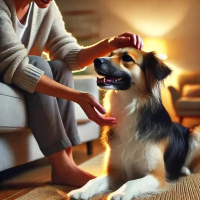What to do with dog aggression? Try CBD!
Author: Lucie Garabasova
Dog aggression is a highly stressful situation for both the owner and the dog itself. Through this article, we aim to answer the most frequently asked questions regarding dog aggression and offer a natural solution to your problems. This solution is the administration of natural CBD drops for dogs, which have calming effects and significantly aid in training. We have verified this!
What causes aggression in dogs?
There are numerous reasons why a dog might be aggressive. These reasons can often overlap.
The most basic include:
1. Fear
Fear is one of the most common causes of aggressive behavior. A dog that feels threatened or scared may react aggressively as a way to defend itself or deter a potential threat. This type of aggression is often associated with anxiety and can be triggered by various stimuli, such as unfamiliar people, loud noises, or unusual situations.
2. Territorial protection
Many dogs are naturally territorial and may show aggression when protecting their home, yard, or area they consider their territory. This type of aggression often occurs when strangers or animals enter the space the dog views as its own.
3. Protection of possessions
Dogs can exhibit aggressive behavior when protecting their possessions, such as food, toys, or even their owners. This type of aggression is known as protective aggression.
4. Pain or health issues
Pain or health issues can cause a dog to react aggressively. For instance, a dog with a sore tooth or arthritis may be more irritable and less tolerant of touch or handling. It's important to consult a veterinarian if you suspect that pain or health problems are the cause of aggressive behavior.
5. Lack of socialization
Dogs that were not properly socialized at an early age might have problems with aggressive behavior. Socialization helps dogs learn how to behave in various situations and interact with people and other animals. A lack of this experience can lead to a dog reacting with fear or aggression to new or unfamiliar stimuli.
6. Genetics
Genetic factors can also play a role in a dog's aggressive behavior. Some breeds may have a greater predisposition to aggression due to their nature and the original purpose for which they were bred. However, this does not mean that every dog of a particular breed will be aggressive – upbringing, socialization, and training are crucial.
7. Bad experiences
Dogs that have experienced traumatic or negative events may show aggressive behavior as a defense mechanism. Such experiences can include abuse, neglect, or attacks by other dogs. These dogs often need a patient and consistent approach to overcome their fears.
8. Training mistakes
Inappropriate or inconsistent training methods can contribute to the development of aggressive behavior. For example, punishing a dog for showing fear or aggression can worsen the situation. Using positive reinforcement and rewarding good behavior is a more effective way to teach a dog proper behavior.
How do I recognize that my dog is aggressive?
Aggressive behavior can include growling, barking, baring teeth, lunging, or biting. It is also important to watch the dog's body language, such as a tense posture, raised fur, or a tucked tail.
How to prevent aggressive behavior in dogs?
Look at the most common causes that lead to aggression and try to avoid them as much as possible. Before getting your first dog, we recommend thoroughly studying the necessary literature or turning to experts who can guide you through dog training and help you avoid unnecessary mistakes.
Can aggressive behavior be changed?
Yes, aggressive behavior in dogs can be changed, but it requires time, patience, and the right approach. Every dog is unique, so it is important to find an individual solution that best suits the specific animal and its situation.
Methods for managing aggression
1. Identifying the cause of aggression
The first step is to understand what is causing your dog's aggressive behavior. It could be fear, pain, territorial protection, lack of socialization, or other factors. Consulting with a veterinarian or a dog behavior expert can be very helpful.
2. Professional help
Working with a professional dog trainer or behaviorist is often crucial. These experts have experience with handling aggression and can provide you with specific advice and techniques for working with your dog.
3. Positive reinforcement
Using positive reinforcement is an effective method for changing behavior. Reward your dog for calm and desirable behavior, which helps it understand what behavior is expected. Avoid punishment, which can worsen aggression and increase anxiety.
4. Desensitization and counter-conditioning
Desensitization and counter-conditioning are techniques that can help a dog overcome fear and negative associations. Desensitization involves gradually exposing the dog to stimuli that trigger aggression in a controlled and safe environment. Counter-conditioning involves creating positive associations with these stimuli using rewards and praise.
5. Socialization
Proper socialization is key to preventing and managing aggressive behavior. Allow your dog to meet different people, animals, and situations in a controlled environment. This helps it learn how to react calmly and confidently.
6. Routine and structure
Dogs need clear structure and routine to feel safe and secure. Maintain a regular daily schedule that includes walks, feeding, and training. This can help reduce stress and anxiety that can lead to aggressive behavior.
7. Stress management
Managing stress is important for changing aggressive behavior. CBD oil for dogs from Cannadorra can be an effective supplement that helps harmonize mental processes and reduce anxiety.
Specific exercises for managing aggression in dogs
Before visiting a proper training center, you can start teaching your dog the following:
1. Positive reinforcement and rewarding
Using positive reinforcement is a basic method for changing behavior. Reward your dog for calm behavior and ignore or redirect undesirable behavior.
- Training calm behavior: When your dog is calm, reward it with a treat or praise. Gradually increase the time it must remain calm before getting a reward.
- Ignoring undesirable behavior: If the dog starts showing aggressive behavior, try not to pay attention to it until it calms down. Then reward it for calm behavior.
2. Training focused on managing emotions
Teach your dog to manage its emotions through specific exercises.
- "Look at me" technique: Teach your dog to look at you when it hears its name or the command "Look at me." Start in a calm environment and gradually add distractions.
- "Place" technique: Teach your dog to go to a specific place (like its bed or a blanket) on command. This provides a safe refuge where it can retreat when feeling threatened or nervous.
3. Physical exercise and mental stimulation
Adequate physical activity and mental stimulation are key to healthy dog behavior.
- Daily walks and play: Ensure your dog gets enough physical exercise every day. Walks, running, and playing can help reduce pent-up energy that can lead to aggression.
- Puzzles and interactive toys: Provide your dog with toys and puzzles that mentally stimulate and engage it.
4. Teaching "No" and "Drop It"
These commands can be useful for interrupting undesirable behavior.
- "No" Command: Teach your dog to respond to the command "No" or "Stop." Use this command consistently and reward the dog when it stops the undesirable behavior.
- "Drop It" Command: Teach your dog the "Drop It" command in case it holds something in its mouth or is about to attack. Start with a toy and gradually move to more realistic situations.
How does CBD help with dog aggression?
CBD has harmonizing effects that can help dogs feel calmer and less anxious.
Specifically, for dogs, it works:
- Against anxiety
- Improves mood
- Reduces pain
- Supports quality sleep
CBD also interacts with the endocannabinoid receptors in the dog's body, helping to regulate mood, stress, and anxiety. This can lead to overall calmness and reduced reaction to stressful stimuli.
How to administer CBD to an aggressive dog?
The key is to choose a quality product and set the right dosage. At Zelená Země, Lucie Garabášová, who specifically represents the animal cannabis advisory service, can help you with this. Together, you will choose the most suitable product concentration and dosage.
Among the most effective methods of administration is dripping CBD drops for dogs directly into the mouth (specifically onto the gum). For aggressive dogs, this might be challenging, so you can help by administering CBD on a small piece of treat, or use CBD treats that already contain CBD to make it easier to give the product to the dog.
Experiences with administering CBD for aggression
Experiences with administering CBD for aggression in dogs are reported at the Anidef shelter, where CBD has been given long-term to an aggressive dog named Max.
Long-term collaboration with the Doggoland shelter has allowed us to gather feedback from use, and we know that CBD significantly speeds up dog training because it helps the dog focus on and perceive you more.
Trainer Hana Böhme also administered CBD to one of her dogs, where she addressed long-term aggression and noted significant progress in training with the use of CBD.
Anxiety and stress: A 2019 study, presented at the International Veterinary Behavior Meeting in Washington, D.C., looked at dogs with separation anxiety and noise phobia. The results showed that dogs given CBD showed less stressful behavior during thunderstorms or when separated from their owners. This study suggests that CBD may help alleviate anxiety states, which may indirectly reduce aggression caused by stress and fear (DVM 360)(Moonlight Natural Pet Store).
Calming and general improvement of well-being: CBD is known for its calming effects. It interacts with the body's endocannabinoid system, which helps regulate mood, stress and anxiety. Research shows that CBD can promote the production of serotonin, a neurotransmitter that plays a key role in regulating mood and feelings of well-being (Moonlight Natural Pet Store).



